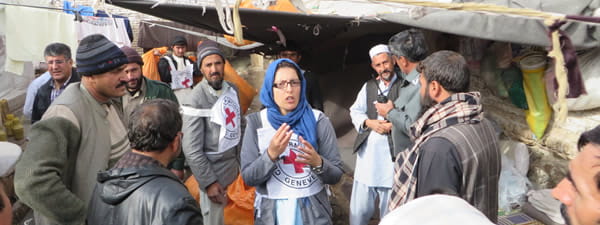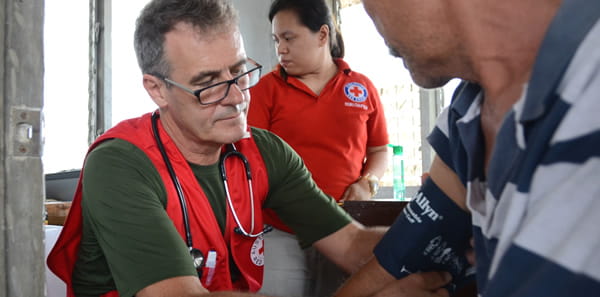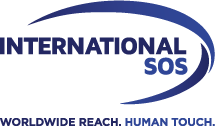Progress Through Partnership
Published: March 2015
FOR MANY YEARS AUSTRALIAN RED CROSS HAS PROVIDED HUMANITARIAN SUPPORT TO VULNERABLE PEOPLE AROUND THE GLOBE.
Working in extreme environments and crisis situations, Australian Red Cross has always placed huge importance on keeping its international aid workers safe and well. But today, with the emergence of new risks in a rapidly changing world, the need to deliver medical and security assistance to its workforce is greater than ever.

Australian Red Cross has been working with International SOS since 2008, to help meet its Duty of Care to aid workers and volunteers in the field. With shared interests and agendas, the two organisations often work side-by-side as they respond to global crises and events. As Yvette Spero, International Health Coordinator at Australian Red Cross, tells Hotline, it is a relationship that has grown over the years to become a powerful and collaborative partnership.
Australian Red Cross is part of the International Red Cross and Red Crescent Movement, the largest humanitarian network in the world, with approximately 17 million volunteers in over 189 countries. Operating autonomously under shared Fundamental Principles of the Movement, Australian Red Cross works as an impartial, neutral organisation committed to preventing and alleviating human suffering wherever it is found. It has a strong domestic focus, providing assistance to vulnerable communities within Australia, as well as a major operational presence in Australasia, Asia-Pacific and the rest of the world.
“At any one time,” says Yvette Spero, “we have up to 60 international aid workers out in the field, which on average means about 250 missions a year. We’re an Australian-based organisation, but our remit is global and we currently have people on the ground in South Sudan, Ukraine, Iraq, Syria, Afghanistan, Vietnam, Nepal, Fiji and West Africa.”
As this list of countries and regions suggests, Australian Red Cross’s international aid workers operate on the frontline of emerging global crises, providing humanitarian support in areas impacted by natural disasters, war, civil strife or disease. In South Sudan, they are currently assisting people who have been displaced by the ongoing conflict in this new and unstable country. In Ukraine, Iraq and Afghanistan they are providing emergency medical care and support to communities affected by war, while in West Africa they are running treatment centres and taking part in regional efforts to manage the Ebola outbreak.
NEW HEALTH AND SECURITY RISKS
The challenging overseas environments in which Australian Red Cross operates have always presented a range of health and security issues. But as Yvette Spero explains, recent socio-political, demographic and environmental changes in the world have led to the emergence of new risks and threats: “We are seeing changes in the prevalence of certain diseases. Dengue fever, for example, is now one of the more common health concerns for our people overseas. Respiratory problems and stomach infections are also rife, but Dengue fever has really come to the fore, particularly across the Asia-Pacific region. We are also seeing local transmission of vector-borne diseases like Chikungunya being reported for the first time in certain areas, such as the Caribbean.” In addition to new patterns of disease transmission, natural disasters are also now more prevalent, as Yvette Spero observes:
“For those Australian Red Cross aid workers in coastal or archipelago regions, landslides and rising water levels are a very real concern. There are also environmental disasters linked to pollution and overcrowding, which in turn give rise to water-borne diseases. These issues are more prevalent now than they were in the past, posing new threats to local communities and to our international aid workers who are out there trying to help.”
Another notable change is the response of certain communities to Red Cross itself. Whereas previously the neutrality of the organisation and its international emblem were respected globally, Yvette Spero and her colleagues have witnessed a decline in levels of understanding and acceptance:
“Our emblem used to protect our workers automatically. But it is not like that anymore; certain parts of the world are simply not as safe as they used to be. There’s more hostility towards perceived western organisations, and more than ever before we have to promote the fact that we are a neutral humanitarian outfit. Protection isno longer a given.”

INTERNATIONAL PARTNERSHIP
Keeping its people safe, and enabling them to do the best job they can for at-risk communities, is of paramount importance for the Australian Red Cross. With often limited healthcare facilities in the areas where they operate, the organisation first came to International SOS looking for help and support in meeting its Duty of Care to its people. And as Yvette Spero explains, since its formulation over six years ago, the relationship between Australian Red Cross and International SOS has evolved significantly:
“International SOS provides us with high-level medical and security assistance. We use their in-country intelligence and updates to prepare our people pre-deployment. We also make frequent use of their Assistance Centres – in fact, I believe we’re among the top ten client organisations in terms of Assistance Centre utilisation.
We are also a unique client; we have our own in-house medical teams and are probably more demanding than most in terms of requesting medical data and reports. And as the relationship has developed we have started to exchange information and expertise a lot more. We have people on the ground in some really remote places, and at times we have been able to supplement International SOS’ response with very precise local knowledge.”
This two-way dynamic has helped to create a very collaborative and constructive partnership. Often responding to the same global crises (International SOS has also recently deployed in Ukraine, South Sudan and West Africa), each organisation has developed a keen understanding of the other’s operational needs and capabilities.
“I have worked overseas for Australian Red Cross,” says Yvette Spero; “And I have seen for myself how the global reach of International SOS can be absolutely critical. Equally, I have been able to suggest local service options based on my own knowledge.”
Having flown the flag for collaborative interaction with International SOS , Yvette Spero believes that other humanitarian organisations should invest in support for their people in the field:
“As far as other non-governmental organisations (NGOs) are concerned, my advice would be – if you have staff in the field, this kind of support and assistance is essential. It is a no-brainer. How can people do their job properly in challenging overseas environments without this kind of assistance? What is more, it is totally universal coverage; whether we have a delegate flying to a conference in Geneva, or an aid worker assessing public health in the Philippines, International SOS is there for them, 24/7.”










